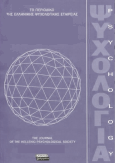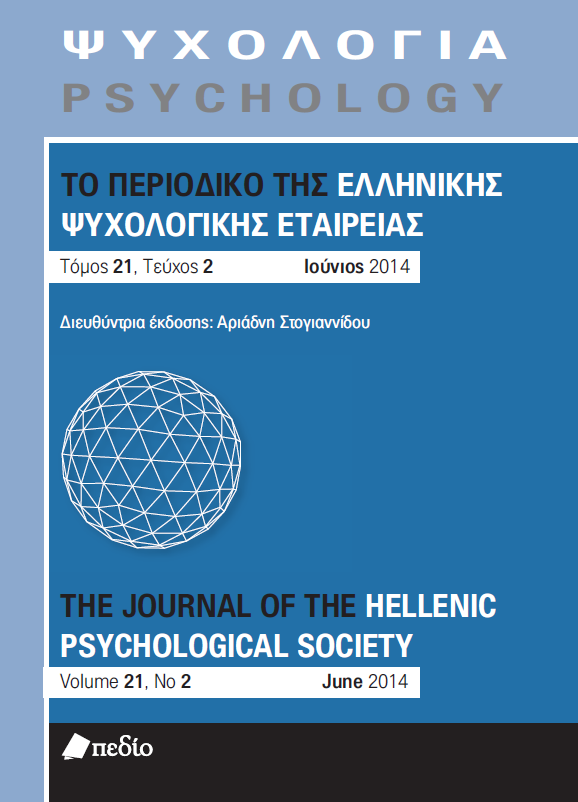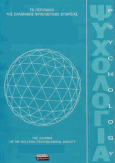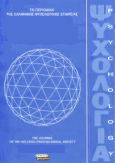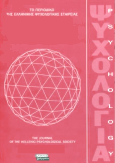Περιγραφή των βασικών ψυχομετρικών χαρακτηριστικών και της παραγοντικής δομής της Ελληνικής έκδοσης του Ερωτηματολογίου Παθολογικού Ναρκισσισμού
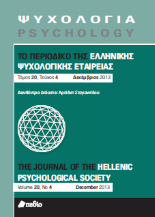
Περίληψη
Σκοπός αυτής της έρευνας ήταν η εξέταση των βασικών ψυχομετρικών ιδιοτήτων της ελληνικής έκδοσης του Ερωτηματολογίου Παθολογικού Ναρκισσισμού (Pathological Narcissism Inventory-PNI:Pincus, Ansell, Pimentel, Cain, Wright & Levy, 2009). Το PNI είναι ένα ερωτηματολόγιο αυτοαναφοράς που κατασκευάστηκε πρόσφατα για την αξιολόγηση τόσο του ναρκισσιστικού μεγαλείου (Τάση εκμετάλλευσης, Φαντασίωση μεγαλείου, Αυτοενίσχυση μέσω της αυτοθυσίας) όσο και της ναρκισσιστικής ευαλωτότητας (Εξαρτώμενη αυτοεκτίμηση, Απόκρυψη
του εαυτού, Υποτίμηση, Δικαιωματική Οργή). Το ΡΝΙ μεταφράστηκε στα ελληνικά και χορηγήθηκε σε 283 φοιτητές. Έγινε επιβεβαιωτική παραγοντική ανάλυση για να διερευνηθεί η παραγοντική του δομή στο ελληνικό δείγμα. Εκτιμήθηκαν υποδείγματα πρώτης και δεύτερης τάξης: α. Το αρχικό υπόδειγμα πρώτης τάξης με επτά παράγοντες, β. Τρία υποδείγματα δεύτερης τάξης με δύο υψηλότερης τάξης λανθάνοντες πα-
ράγοντες (Μεγαλείο, Ευαλωτότητα) γ. Τρία υποδείγματα δεύτερης τάξης με τρεις υψηλότερης τάξης λανθάνοντες παράγοντες (Μεγαλείο, Ευαλωτότητα, Κακοήθεια). Τα ευρήματα δείχνουν καλύτερη προσαρμο-
γή για το υπόδειγμα των επτά παραγόντων, ωστόσο, οι δείκτες καλής προσαρμογής είναι αποδεκτοί και για τα περισσότερα από τα υποδείγματα δεύτερης τάξης. Οι δείκτες αξιοπιστίας ήταν στα αποδεκτά πλαίσια
για όλες τις υποκλίμακες. Αξιολογούνται θεωρητικά τα υποδείγματα και εκτιμώνται συνολικά τα πλεονεκτήματα της αξιολόγησης του ναρκισσισμού στην Ελλάδα με το ΡΝΙ.
Λεπτομέρειες άρθρου
- Πώς να δημιουργήσετε Αναφορές
-
Καρακούλα Π., Τριλίβα Σ., & Τσαούσης Ι. (2020). Περιγραφή των βασικών ψυχομετρικών χαρακτηριστικών και της παραγοντικής δομής της Ελληνικής έκδοσης του Ερωτηματολογίου Παθολογικού Ναρκισσισμού. Ψυχολογία: το περιοδικό της Ελληνικής Ψυχολογικής Εταιρείας, 20(2), 160–175. https://doi.org/10.12681/psy_hps.23534
- Τεύχος
- Τόμ. 20 Αρ. 2 (2013)
- Ενότητα
- ΕΜΠΕΙΡΙΚΕΣ ΕΡΓΑΣΙΕΣ

Αυτή η εργασία είναι αδειοδοτημένη υπό το Creative Commons Attribution-ShareAlike 4.0 International License.
Το περιοδικό ΨΥΧΟΛΟΓΙΑ έχει υιοθετήσει μία πολιτική Platinum open-access. Τα έξοδα υποβολής, επεξεργασίας ή δημοσίευσης των εργασιών καλύπτονται από την Ελληνική Ψυχολογική Εταιρεία. Τα πνευματικά δικαιώματα των δημοσιευμένων εργασιών προστατεύονται από την άδεια 'Creative Commons Attribution-ShareAlike 4.0 International'. Οι Συγγραφείς διατηρούν τα Πνευματικά Δικαιώματα και χορηγούν στο περιοδικό το δικαίωμα της πρώτης δημοσίευσης. Η άδεια αυτή επιτρέπει σε τρίτους, να χρησιμοποιούν την εργασία σε οποιαδήποτε μορφή, με την προϋπόθεση της διατήρησης των διατυπώσεων που προβλέπονται στην άδεια σχετικά με την αναφορά στον αρχικό δημιουργό και την αρχική δημοσίευση στο περιοδικό ΨΥΧΟΛΟΓΙΑ. Επιπλέον, κάθε διανομή της εργασίας οφείλει να γίνεται με τους ίδιους όρους διανομής, δηλαδή με την ίδια άδεια Creative Commons.




